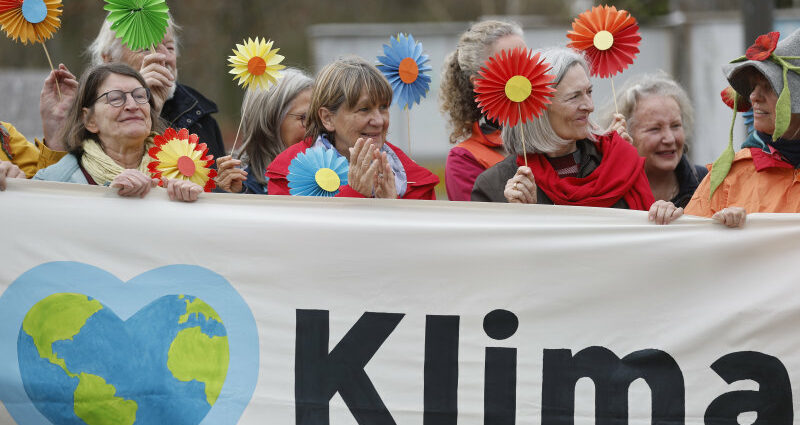New York: A tiny Pacific Island nation has pulled off the kind of diplomatic win that can elude global superpowers.
On Wednesday, US time, Vanuatu, population 300,000, rallied a majority of countries to ask the world’s highest court to weigh in on a high-stakes question: can countries be sued under international law for failing to slow down climate change?
People demonstrate outside the European Court on Wednesday, when a group of Swiss retirees took their government to the top European court for failing to take stronger action on climate change. Credit:AP
The measure passed by consensus, meaning none of the 193 member states requested a vote. The General Assembly hall erupted in applause.
That it was adopted by consensus reflects widespread frustration over the fact that the greenhouse gas emissions warming the planet and wreaking havoc on the poorest nations are not being reduced quickly enough.
United Nations Secretary-General Antonio Guterres said the move “would assist the General Assembly, the UN and member states to take the bolder and stronger climate action that our world so desperately needs”.
In essence, with this resolution, the world’s nations are asking the International Court of Justice, based in The Hague, to issue an opinion on whether governments have “legal obligations” to protect people from climate hazards and, more crucially, whether failure to meet those obligations could bring “legal consequences”.
The international court’s opinion would not be binding. But, depending on what it says, it could potentially turn the voluntary pledges that every country has made under the Paris climate accord into legal obligations under a range of existing international statutes, such as those on the rights of children or the Universal Declaration of Human Rights. That could, in turn, lay the groundwork for new legal claims.
A few national courts have already relied in part on international law to rule in favour of climate activists’ lawsuits. Last week, a court cleared the way for a youth-led group of activists, including Greta Thunberg, to sue the Swedish state for not doing enough to slow climate change.
The UN resolution is among a raft of legal and diplomatic volleys aimed at big emitter nations. It began when a group of law students from Pacific Island nations proposed asking the International Court of Justice whether existing international law could be used to protect future generations.
A similar idea had been floated years ago by the Marshall Islands and Palau. But it went nowhere because of opposition from powerful countries. The United States has authority over the defence of both.
Achieved a feat: Vanuatu’s Prime Minister Alatoi Ishmael Kalsakau Ma’aukoro. His country has managed to unite the UN General Assembly in pushing for a vote on the question of legal responsibility for climate action.Credit:James Brickwood
Vanuatu took up the measure last year. Other Pacific Island nations joined in, then several from Africa and Asia. By the time the draft resolution came up for a vote, it had 105 nations signed on as co-sponsors.
Vanuatu is also among a group of vulnerable island nations pressing for a global fossil fuels non-proliferation treaty.
Like many other low-lying islands, it is on the front line of climate hazards.
Six villages on four of its islands have been relocated, as rising sea levels, a telltale sign of climate change, have turned water supplies so salty as to be undrinkable. Cyclones and warmer ocean waters have destroyed coral reefs. Its most valuable commodity is tuna, but the fish are increasingly moving away from Vanuatu’s territorial waters as the oceans warm.
This article originally appeared in The New York Times.
Most Viewed in World
From our partners
Source: Read Full Article
-
Network of monkey torture exposed with people from UK paying to kill on camera
-
Incredible 80ft superyacht Cujo used by Princess Diana in her final summer with Dodi Fayed sinks after crash in Med | The Sun
-
Ex-policeman jailed over producing child abuse material that caused ‘immeasurable damage’ to victims
-
‘Osama bin Laden tested chemical weapons on my dogs,’ evil terrorist’s son says
-
Family whose £100,000 Bentley was stolen slam the Met police



